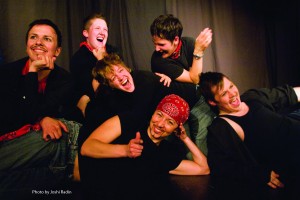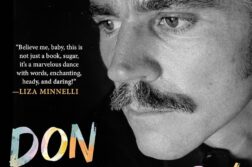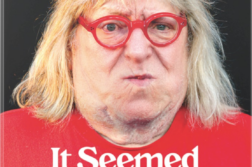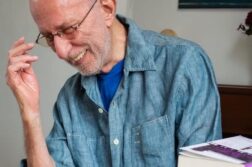FORMED IN 2002 in Boston, All The Kings Men started as drag kings participating in open-mike nights and drag slams at local lesbian bars. While they are still often publicized as “kings,” the six female members work to surpass drag convention and create multifaceted, entertaining, gender-bending shows that incorporate a variety of performance genres. Using elements of traditional burlesque, sketch comedy, slam poetry, modern dance, satire, and Weimar-style cabaret, All The Kings Men is a group that innovates and redefines drag and queer performance while confronting gender issues through funny, audience-involving shows. ATKM is also the focus of the 2009 independent documentary Play in the Gray, already screened in many American cities and catching national attention.
All the Kings Men are Katie Allen, Julee Antonellis, Leighsa Burgin, Jill Gibson, Maria Kogan, and Karin Webb. I intereviewed them in person late last year. Helen Deborah Lewis: You describe yourselves on your website as “an award-winning, all-female prolific physical theatre ensemble performing in the cabaret style.” You write and do comedic and dramatic storytelling that pushes gender boundaries. You compare yourselves to a kind of ragtag Shakespeare troupe, to the Blue Man Group, to character-based sketch comedy in the spirit of Second City. You’re popular entertainment that can be done in the back of a bar, but you also employ legitimate theatrical convention. Help me out here. HDL: Despite efforts in marketing, despite word of mouth, do you find that you are thrown into the drag [genre]? HDL: The first time I saw you guys perform was at the Art House in Provincetown. Because Provincetown is this oasis for queer and camp performance, was it easy to immerse yourself in that? HDL: What I think is interesting is that you guys are getting involved in burlesque in a way that’s very new and different. HDL: It seems like you’re using gender bending to confuse people in your shows. Helen Deborah Lewis, who is completing a doctorate in drama at Tufts, has taught at the Boston Conservatory and UMass–Boston.
Jill Gibson: What we do involves many genres. Being a cabaret act in and of itself has kind of disallowed one simple word to define us. Over time, we felt very limited by the use of the term “drag king.” I think that was definitely how All The Kings Men started. There are many warmer, richer elements to our show. We feel our work is more character-based than just “drag king.”
Leighsa Burgin: I think that we first described ourselves as a drag king troupe because that’s how we came together. But over the years, we didn’t want to be stuck with just one title, just as over the years and especially the past couple of years we’ve introduced a lot of different types of performance into our show.
Karin Webb: When we started out, it wasn’t that serious. Half of us are trained actors and we all have a lot of performance under our belt in various ways. We’re individually interested in politics that aren’t necessarily encompassed by the drag king culture. We also don’t follow a traditional form. We all play male, female, trans, and non-gendered characters, plus animals. The more we evolved our own personal voices, the more we realized that what we were really interested in putting together was a theatrical show that’s character-based. And yes, it definitely does have roots in drag king culture, but it also follows in the footsteps of commedia dell’arte, melodrama, clowning, and burlesque.
Maria Kogan: We started performing in drag—the drag competitions at different bars. So, in a sense, our act was already labeled for us.
Leighsa Burgin: Well, I think that’s really important, because we were definitely born out of the drag king scene. But it’s not that we’re necessarily girls playing guys. It’s open to the audience’s interpretation whether or not, say, Julee and Maria in “Go-Go” are boys or gay women or trans people. We like to leave that open for the audience to interpret. As time goes on, I feel like we’re trying to shut out descriptors and boxes and titles. We don’t want to be trapped by them.
Karin Webb: I think both of those things. If we’d started out in a non-queer community, I don’t think we’d be regarded as drag kings. I think we’d be relegated to a gender-bending comedy troupe. There would be a totally different context to what we do. But I think since we are all queer and we started out in the queer community, which does drag, we’re considered drag. But what we’re really committed to is putting on quality theatre. We continually try to transgress our own policies, even about what it is that we are. It would be nice if the community and the world and the culture would catch up!
Julee Antonellis: In P-town, everybody barks for their show, even big names, people who are on TV. P-town is a competition for time slot and interest. And the times that we go down, usually there are a lot of women. If we were down there during a time like Bear Week, we might have a tough time!
Leighsa Burgin: It’s a hard sell in P-town, no matter who you are. There’s so much going on at all times, it’s always competitive regardless of your show’s content.
Karin Webb: If you’re confident in your own show, that goes a long way. If you’re not confident in that talent, you’re not going to last very long. You have to be willing to hit the pavement. You have to believe in your product. If you don’t believe in your product, nobody’s going to come see it.
Leighsa Burgin: I think we all hope we’re doing something different and new. I feel that our process and our rehearsal and the polish of our finished product are apparent in our show. So, even if people are thinking that they might have seen something like this before, I really hope that they’re seeing it in a way that they haven’t seen it done before.
Karin Webb: I have a background in classical ballet and character–based theatre. And so, the things I do are very character-based and movement-oriented, where someone else, like Julee, is very studied and she does caricatures and impersonations really well, and she tends to do work that’s rooted in some of those things. I think each one of us creates work that in some place is about where we come from and where we want to go and something we want to learn that’s new or that we haven’t had a chance to say before.
Julee Antonellis: The more that any actor branches out and does something else, or even if you step away from theatre entirely, check out for a little bit, you’re always gaining some perspective. Because theatre in general, no matter what, is based on your life experience, and the more life experience you have, the more you have to say.
Leighsa Burgin: All of us bring in material that we’re interested in. Political stuff that’s going on is what I like to comment on. A couple years ago, we all said “yes” to each other: “Yes, you can do spoken word. Yes, you can do standup. Let’s all do whatever we want.” I think that freed us up to be more prolific and more creative and to expand our show. Over the past two years, we’ve had a lot of growth and a lot of different things going on.
Katie Allen: I love confusing people. I love that we keep people guessing. It doesn’t matter where they came from or what they look like and what they do, we tend to leave them thinking, “What the hell?”—in a good way. I love fucking with people; I love it.





